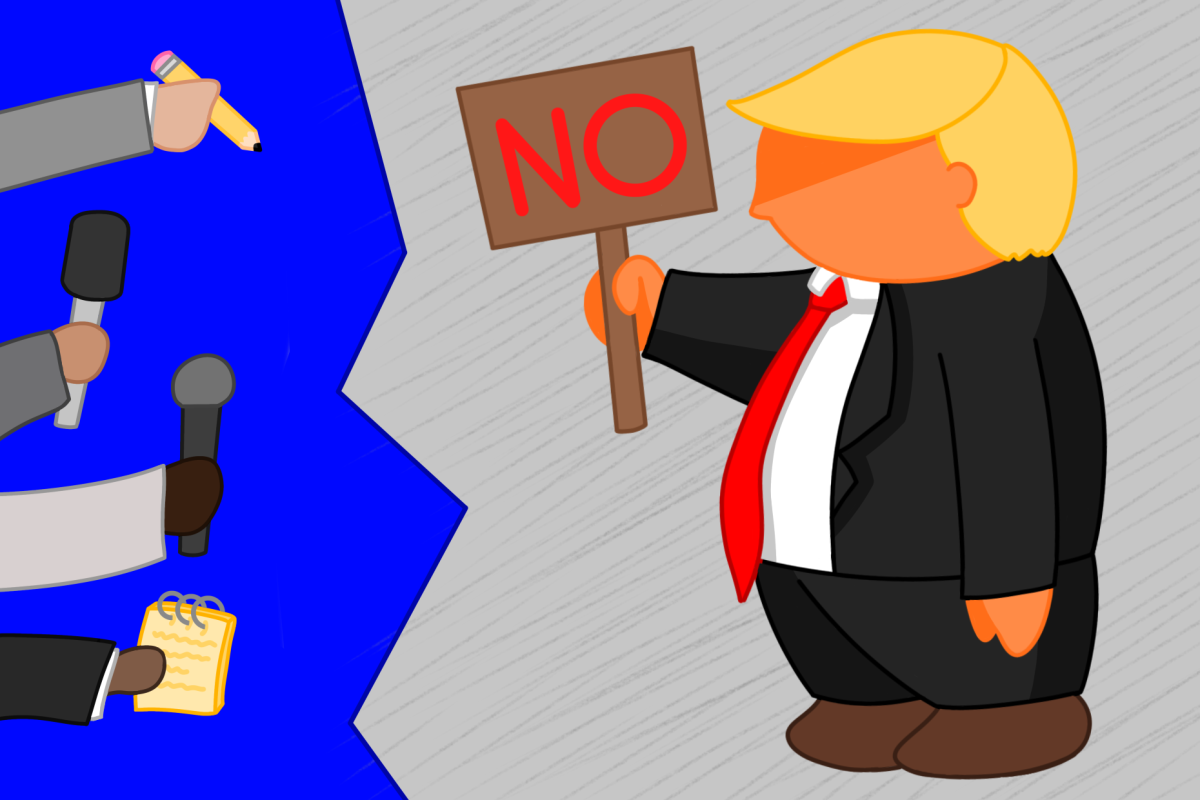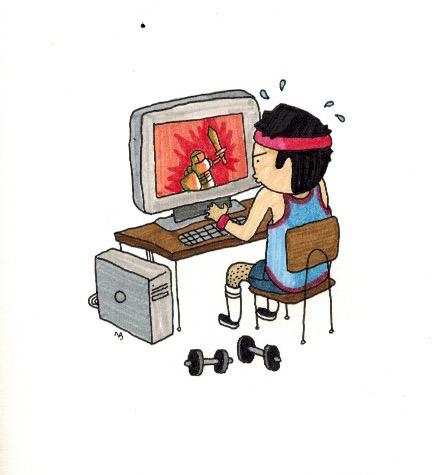In South Korea, gaming isn’t a hobby. It’s a culture.
Professional gaming teams live together alongside their coaches in luxurious apartments. They’re A-List celebrities – they sign autographs as they walk down the street and have six-figure incomes. And, usually, they’re recruited while they’re still in high school.
For non-professional gamers, “PC Bangs” are a common social hangout. Inside these PC Bangs, or “PC room” in English, people can play online multiplayer games for an hourly fee. They serve drinks and snacks and allow players to smoke while they play, catering to people who spend 10 to 12 hours of their day inside.
Story by Emily Gibson
Illustration by Nathan Burgess
South Korea’s enthusiasm for professional gaming has begun to spread across the world. Worldwide competitions for games like League of Legends, StarCraft and DoTA 2 attract millions of viewers and give out thousands of dollars in prize money.
On Oct. 19, a group of people huddled around a television in Austin’s Forte Lounge and Café to watch the World Championship of online battle-arena game, League of Legends.
People around the globe streamed the event from their homes while over 40,000 people gathered in Seoul’s Sangam Stadium to watch the South Korean team, Samsung Galaxy White, defeat the Chinese team, Star Horn Royal Club, live. Tickets to attend the live event sold out.
This year’s opening ceremony featured alt-rock band Imagine Dragons performing the song they wrote for the game “Warriors.” Commentators offered people streaming the event a live play-by-play; people dressed up to look like characters from the game and screamed in support of their favorite team. Confetti fell from the ceiling when the game was finished. After winning, Samsung Galaxy White took home $1 million in prize money and a 70-pound trophy called “The Summoner’s Cup.”
It was estimated that this year’s online streaming viewership of the Worlds would surpass last year’s 32 million. The final game of the 2014 FIFA World Cup, which was hosted at Sangam Stadium just 12 years ago, averaged around 17 million viewers in the United States.
Over the past few years, video gaming has grown exponentially. According to the New York Times, the video gaming industry makes $20 billion more globally than the music industry and is catching up to the movie business.
Professional gaming leagues — like Major League Gaming and the Electronic Sports League — have been founded in America and Europe, respectively, and host tournaments for a variety of games. The eSports Association (TeSPA), which was started at the University of Texas at Austin and has since expanded, is a competitive network between gaming teams on college campuses across the country.
Despite the rising popularity of competitive video gaming, some are still reluctant to use the word “sport” in relation to the phenomenon. In a survey conducted in Austin, only 31 percent of people considered gamers athletes and video games sports.
Juan Nevarez, the current president of the UT chapter of TeSPA, believes that competitive gamers should be considered athletes.
“I understand that it is kind of hard for most people to wrap their heads around the concept of eSports, but quite frankly I think the word athlete is the one that describes professional gamers the best,” Nevarez says. “These are people who are among the most skilled at the games they compete in. They are making a living out of what they are most proficient at, just like your average athlete.”
Nevarez became interested in TeSPA when he started playing League of Legends. He says for him, it has been one of the best things about his college experience because it was created “for and by people who have a passion for gaming.”
McVay Bennett, a competitive gamer living in Austin, thinks that if gamers were considered athletes, people would begin to think differently of the word – being an athlete is not just about physical skills, but also reflexes and mental processing.
According to him, if other reflex and mental-based competitors – like professional racecar drivers – are going to be considered athletes, gamers should be, too.
“Neither have to run faster, longer, lift more or jump higher than anyone else – but they all have to have razor focus, incredibly fast reflexes and the ability to withstand long periods of times in tight conditions while maintaining that extreme focus,” Bennett says of drivers and gamers.
Although ESPN President John Skipper stated in September that eSports are not valid and should not be broadcast on the popular sports network, the League of Legends Worlds were aired on ESPN3, as was the championship of online battle-arena game DoTA 2 earlier in the year. Nevarez believes it won’t be long until video gaming competitions are a regular part of channel schedules.
They’ve already started making their way onto college campuses.
This fall, Robert Morris University in Chicago became the first institution to offer an athletic scholarship to competitive video gamers.
“Although eSports have long been a part of the culture of gaming, competitions have seen a large surge in popularity in recent years. Robert Morris University recognizes the value and legitimacy of eSports and is excited to add eSports to its already rich athletic program,” the school wrote on their athletics website.
The scholarship will cover up to 50 percent of tuition and 50 percent of room and board. To receive the money, gamers will be ranked based on their ratings and performance during a tryout process.
Here in Austin, only 35 percent of people surveyed thought UT should start awarding a similar scholarship.
Greg Baker, associate director of Information Technology services at UT, thinks that colleges should offer scholarships to gamers in the future, but not until there is a more structured network of gaming programs.
“Not yet,” Baker says. “Colleges should give scholarships to gamers when the gaming team is a professional college organization – when they have to show up for practice everyday like baseball or basketball, or any other official sport.”
The world of competitive video gaming can seem daunting and vast, but Bennett urges newcomers and onlookers to ignore the negative stigmas surrounding video gamers. He recalls the people he played alongside at the 2003 Cyberathlete Professional League tournaments in Dallas, where he went by Thrash.
“They were all average teenagers,” Bennett says. “Some were athletic, some a bit geeky — all of them were just people in a very normal sense. We had parties, drank, did stupid shit and happened to be very good at video games.”







































